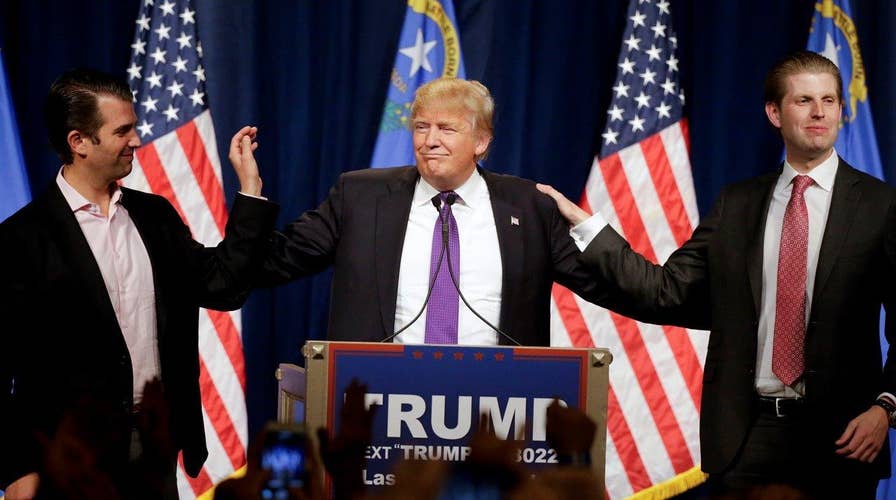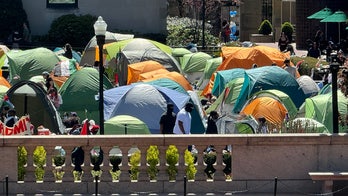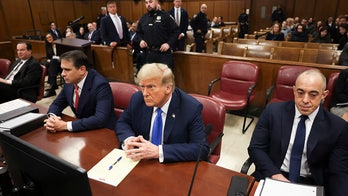Trump: If I win, Americans aren't going to be angry anymore
Republican presidential frontrunner talks victory in Nevada, fixing the nation's problems and path to the GOP nomination
On to Texas.
And Georgia. And nearly a dozen other states as White House hopefuls set their sights on the high-stakes “Super Tuesday” contests just days away.
Even with the South Carolina Democratic primary still to come this weekend, who lives to fight on in both party nominating contests could be decided less than a week from now.
On the Republican side, Texas is already shaping up as a battleground next Tuesday. Donald Trump, coming off a big win in Nevada Tuesday night, told Fox News he’s not backing down from a Lone Star showdown with Sen. Ted Cruz.
The billionaire businessman said he also expects to beat Republican challengers Sen. Marco Rubio of Florida and Ohio Gov. John Kasich in their own home states -- though Florida votes later in March.
“Ted is the sitting senator there but we have a sitting senator in Florida and I’m number one by far in Florida,” Trump said during a telephone interview Wednesday. “And as you know, the governor of Ohio and I’m number one in Ohio. That came out yesterday and people were really quite surprised, but very substantially number one in Ohio. So when you look at Ohio and look at Florida and now the only one I have to do is Texas, I will focus on it. I’m very close.”
More than a dozen states and U.S. territories will hold primaries and caucuses on March 1, but delegates are only at stake in 11 of them. About half the delegates needed for a Republican candidate to win the GOP nomination are up for grabs. For Democratic candidates, Hillary Clinton and Vermont Sen. Bernie Sanders, about a third of the delegates they need to secure the nomination will be decided Tuesday.
On the road to Super Tuesday, Clinton is looking to score a win this Saturday in South Carolina.
Trump’s convincing victory in the Nevada Republican Caucus, meanwhile, was his third straight win. And it delivers a sharp warning to his rivals and the party establishment that time may be running out to slow his march to the nomination.
Rubio edged out Cruz by fewer than 2,000 votes, according to The Associated Press vote count.
Far behind were retired neurosurgeon Ben Carson and Ohio Gov. John Kasich, who earned 5 percent and 4 percent of votes, respectively.
Before a cheering crowd of supporters in Las Vegas, Trump teased those who predicted he wouldn’t do well in this contest and others.
“Now we’re winning, winning, winning,” Trump said. “Soon, the country is going to start winning, winning, winning.”
Entrance polls in Nevada showed Trump was buoyed by support from a range of groups, including Hispanics and evangelicals. And he dominated among caucus-goers who said they prefered an outsider.
While Trump builds his base, Rubio and Cruz are still fighting to cut into his lead, with diminishing opportunities to do so.
Rubio has enjoyed some momentum after his second-place finish Saturday in the South Carolina primary. But even as he wins over endorsements from "establishment" figures, the Florida senator has yet to notch his first election victory, raising continuing doubts over whether he could be a successful Trump alternative.
He did get one high-powered vote on Tuesday, though -- a spokeswoman said Nevada Gov. Brian Sandoval cast his ballot for Rubio.
Cruz, meanwhile, is trying to shake doubts about his campaign and recover after a tough stretch during which his campaign repeatedly was accused of "dirty tricks" -- leading him to fire his top spokesman over one incident.
At Cruz's watch party in Vegas, he maintained he’s still the best candidate to go up against Trump – and the Democratic nominee. In a knock at Rubio, he noted only two candidates, him and Trump, have won one of the first three contests and said voters will have a “clear choice” next Tuesday.
“One week from today will be the most important night of this campaign,” Cruz said.
Cruz won the Iowa caucuses, but has struggled to follow that up since. He finished third in South Carolina, despite an electorate full of the kind of evangelical voters who thus far have carried his campaign.
Trump charged into Nevada with unrelenting attacks on Cruz’s character.
"There's something wrong with this guy," Trump said at a Las Vegas rally Monday night. On Tuesday, he called Cruz a "soft, weak, little baby" who lies.
Polls had shown Trump leading in Nevada, but polling in The Silver State is sparse and the contest is often unpredictable. Mitt Romney won the last two GOP caucuses in 2008 and 2012.
Early Wednesday, the Nevada Republican Party announced that over 75,000 voters had cast ballots, a new turnout record for the caucus.
The caucus marked the first Republican election in the West, and the fourth of the campaign.
Trump's rivals concede they are running out of time to take him on. The election calendar suggests that if the New York billionaire's rivals don't slow him by mid-March, they may not ever. Trump swept all of South Carolina's 50 delegates, giving him a total of 67 compared to Cruz and Rubio who had 11 and 10, respectively, heading into Nevada.
An Associated Press tally early Wednesday showed Trump with 12 of Nevada's 30 delegates, while Cruz and Rubio each received five with another eight delegates yet to be allocated.
Rubio and Cruz have been laying into each other viciously in recent days, an indication they know Trump can be slowed only if one of them is eliminated.
Rubio -- who finished third in Iowa and fifth in New Hampshire -- had already left Nevada, preferring to campaign in Minnesota and Michigan. In recent days, he has also picked up support from such Republican establishment heavyweights as Arkansas Gov. Asa Hutchinson, North Carolina Sen. Thom Tillis and Utah Sen. Orrin Hatch.
"We have incredible room to grow," Rubio told reporters during a Monday night news conference on his campaign plane.
The Associated Press contributed to this report.





